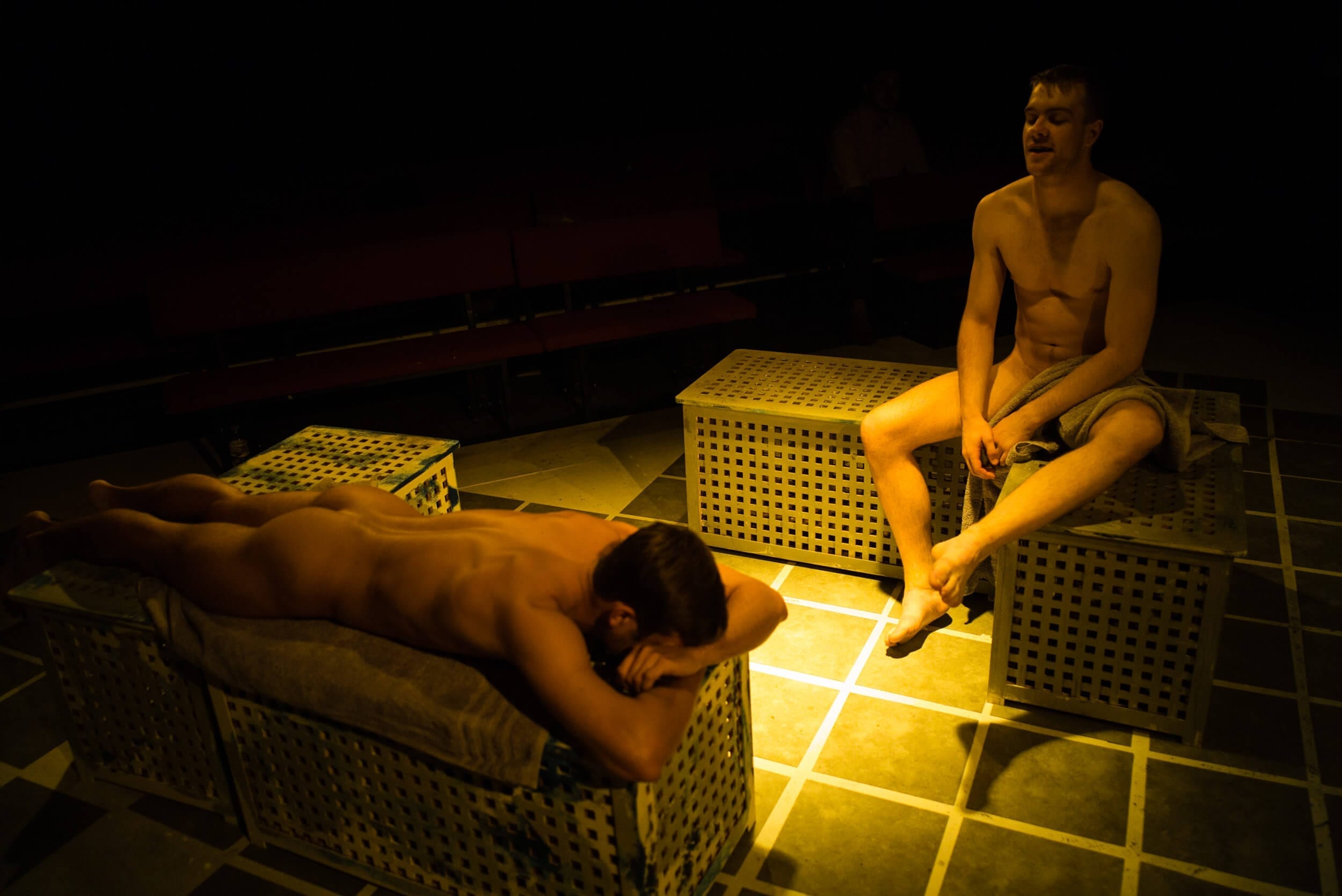“Don’t you know what ‘no’ means?”
“It means that you’re a woman.”
Joe DiPietro’s Fucking Men is based on Arthur Schnitzler’s 1900 Le Ronde, and examines the social and domestic politics of sex through a series of encounters; in Pietro’s version the encounters occur between men. The play returns to the King’s Head Theatre, where it premiered in 2009 directed by Phil Wilmott—but this time ten characters are played by or squeezed into three bodies, and much to the credit of the cast, one is never sure which. Unlike the wounds, scars, and proudflesh of DiPietro/Hyland/Barford’s naïve or jaded, edgy or anxiously expansive, grieving or defensively garrulous, agonizingly optimistic or hopelessly fatuous characters whose quintessential theme too, after all, is adaptability, the seams stitching this adaptation together are invisible. Though technically admirable, this is slightly unfortunate: when things go sour one isn’t sure whom one ought to blame.
The drama (and it is one—thanks again to the swinging physical suavity and deliberate, sustained, empathetic emphasis with which Di Lisle, James, and Whiteside alternately puncture and punctuate the quicksilver, diverse text, that turns spotlit epigraphic/epigramic monologue into dialogue, the theatrical into the symbolic into the specific, the human condition into the purely, individually representative, switches between the rounded luxuriance of narrative and the pointed sharpness of the aphoristic, metonymic storytelling tradition)… The drama achieves a great deal in 70 minutes. It affects the audience deeply through the actors’ persuasive rendering of compassionately crafted characters, is ironic and funny and sympathetic, kind and cutting by turns, uses the minimalism of the space and set to its advantage, heightening the physical intimacy between character and character, encounter and encounter, character and cast, the watcher and the watched. It is rhetorically poignant and pithy (in his incarnation as playwright and metaphorical player Di Lisle especially is a master of exquisitely measured, truth-inflected, emotive enunciation of the uninterruptable, uncorruptable, silk-smooth text), and employs stark shifts in lighting as well as a kind of heartstring-tugging bebop-jazz scene-change music to at once distract the spectator from her or his complicity in the voyeurism which characterizes almost all human cultures that, as one, perpetrate violence through the enforcement of visibility upon those they deem anyhow different (to lull said voyeur into quietude, harmlessness), and by so doing, emphasize this role we the audience fill, inhabit and revel in every day with such practiced enjoyment, and such a sense of its unquestionability.
It is a delicate, delicately performed manoeuvre—but there are moments through this play, suddenly ungainly, acting and dialogue alike overemphasized and predictable, simplistic, that sneak in a suspicion that this particular cleverness is perhaps not entirely intentional. An ugly vein of dismissive misogyny, for instance, coils about Fucking Men and sometimes seriously detracts from one’s appreciation of the otherwise tender, careful treatment of its characters. The quote this review begins with is the striking and graphic example. In Pietro’s version the words are uttered by an unequivocally and unproblematically arrogant, facile character; here he’s tied through Whitehead to two others, both of whom articulate the fundamental fragility of being human. Consequently the very tenderness of characterization that is such an invaluable resource for this play, its narrative as well as its conceptual coherence and ideological force, gives the words of an impoverished intelligence inordinate power. Effectively, in one stroke and for the sake of a very cheap laugh, an endearing protagonist-figure succeeds in equating refusal of consent with femininity and femininity with puerility, ludicrousness, unreason, idiocy. Regrettably, it isn’t original; it certainly isn’t funny.
But perhaps it isn’t meant to be. In Fucking Men relations of private as well as public love are invariably conciliatory, compromised, callous; the theatre, despite its portrayal of humanity as the wish, the wish, the wish to “only connect”, is inevitably a theatre of explicit or implicit cruelty.




